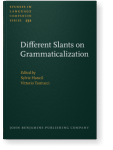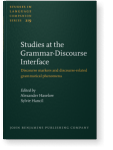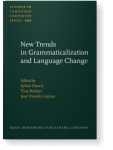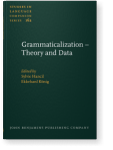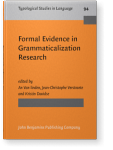Reijirou Shibasaki
List of John Benjamins publications for which Reijirou Shibasaki plays a role.
2023 Chapter 1. From comparative standard marker to comparative adverb: On the contact-induced (de)grammaticalization of
yori
in modern through present-day Japanese Different Slants on Grammaticalization, Hancil, Sylvie and Vittorio Tantucci (eds.), pp. 20–49 | Chapter
This study investigates the grammaticalization of the Japanese ablative marker
yori
‘from’ into a comparative standard marker ‘than’ and further into a comparative adverb
yori
‘more.’ It is widely known that ablative markers can be grammaticalized into comparative… read more
2021 Chapter 4. Reanalysis and the emergence of adverbial connectors in the history of Japanese Studies at the Grammar-Discourse Interface: Discourse markers and discourse-related grammatical phenomena, Haselow, Alexander and Sylvie Hancil (eds.), pp. 101–124 | Chapter
This study deals with issues related to the development of stand-alone adverbial connectors such as totan(-ni), shunkan(-ni), hyoosi(-ni), and yasaki(-ni) in sentence-initial position in the history of Japanese. These adverbial connectors, which can be witnessed from the early twentieth century,… read more
2018 From the inside to the outside of the sentence: Forming a larger discourse unit with jijitsu ‘fact’ in Japanese New Trends in Grammaticalization and Language Change, Hancil, Sylvie, Tine Breban and José Vicente Lozano (eds.), pp. 333–360 | Chapter
This study examines the development of the projector jijitsu ‘the fact is, in fact’ from the earlier nominal predicate jijitsu-nari/dearu/da/desu/dearimasu (fact-copulative verb) in Modern through Present-day Japanese. Evidence from corpus studies suggests that jijitsu undergoes both formal and… read more
2018 Chapter 11. Sequentiality and the emergence of new constructions: That’s the bottom line is (that) in American English Explorations in English Historical Syntax, Cuyckens, Hubert, Hendrik De Smet, Liesbet Heyvaert and Charlotte Maekelberghe (eds.), pp. 283–306 | Chapter
This study aims to investigate a specific construction in spoken discourse, i.e. that’s (not) the bottom line is (that) and its variant forms, in recent American English. The function of the bottom line is (that) is for a speaker to introduce or anticipate upcoming talk, while that’s the bottom… read more
2014 More Thoughts on the Grammaticalization of Personal Pronouns: Evidence from the history of Japanese Grammaticalization – Theory and Data, Hancil, Sylvie and Ekkehard König (eds.), pp. 129–156 | Article
The grammatical category of personal pronouns is one of the most researched domains in Japanese as well as in other languages. In fact, works on the genesis and development of Japanese personal pronouns in comparison to those in other languages have been continuously reported long before the notion… read more
2012 “Please tilt me-ward by return of post”: On the vicissitude of a marginal pronominal construction in the history of English English Historical Linguistics 2010: Selected Papers from the Sixteenth International Conference on English Historical Linguistics (ICEHL 16), Pécs, 23-27 August 2010, Hegedűs, Irén and Alexandra Fodor (eds.), pp. 289–310 | Article
This study is aimed to probe into one type of pronominal word formation such as me-ward, us-ward, you-ward, thee-ward, him-ward, her-ward and them-ward, including all of their variant forms. Although having been used for a prolonged period of time from the early 13th century, they have gone… read more
2010 Frequency as a cause of semantic change: With focus on the second person form omae in Japanese Formal Evidence in Grammaticalization Research, Van linden, An, Jean-Christophe Verstraete and Kristin Davidse (eds.), pp. 225–244 | Article
This study argues for a reinterpretation of the linguistic evolution of personal pronouns in the history of Japanese, with special focus on the second person form omae. While prior research has found certain syntactic and semantic differences between Japanese pronouns and Western counterparts, no… read more
